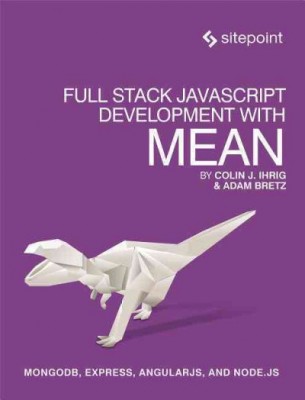| Full Stack JavaScript Development with Mean: Mongodb, Express, Angularjs, and Node.Js Contributor(s): Ihrig, Colin J. (Author), Bretz, Adam (Author) |
|
 |
ISBN: 0992461251 ISBN-13: 9780992461256 Publisher: Sitepoint OUR PRICE: $35.96 Product Type: Paperback - Other Formats Published: January 2015 * Not available - Not in print at this time * |
| Additional Information |
| BISAC Categories: - Computers | Programming Languages - Javascript - Computers | Web - Web Programming - Computers | Web - Design |
| Dewey: 005.276 |
| Physical Information: 0.8" H x 7" W x 9.1" (1.15 lbs) 320 pages |
| Descriptions, Reviews, Etc. |
| Publisher Description: With modern tools. it is possible to create a production grade, full-stack application using HTML, CSS, and JavaScript alone. The combination of MongoDB, Express, AngularJS, and Node.js has become so popular that it has earned the title MEAN stack -- the subject of this book. This book explores the MEAN stack in detail. We will begin by covering Node.js, as it will lay the groundwork for all of our server-side work. You will learn how to get Node running on your local machine as well as download modules using npm. The key aspects of the Node.js programming model will also be covered. From there, we will move on to MongoDB, where you'll learn how to interact with Mongo from a Node application. You will also learn how to create, retrieve, update, and delete data from a Mongo store. After you have a solid grasp on Node and Mongo, the book will move on to the Express web server. We'll cover the basics of Express applications via topics like routes and middleware. Building on previous chapters, we will cover the integration of Node, Mongo, and Express. Our coverage of the MEAN stack will wrap up with several chapters on AngularJS. These chapters will cover Angular fundamentals like data binding, directives, controllers, routing, and services. In an effort to explore competing technologies, a slight introduction to Ember.js will also be provided. Full stack JavaScript is not fully encompassed by the MEAN stack. There is an entire ecosystem of JavaScript tools to learn about, and this book will introduce a few of them. We will cover task runners Gulp.js and Grunt.js which are extremely useful for automating mundane, repetitive tasks. We'll also cover JSHint, a linting tool used to improve code quality. Linting tools analyze source code and report potentials issues - a feature that is especially useful in non-compiled languages like JavaScript. |
Contributor Bio(s): Ihrig, Colin J.: - Colin Ihrig is a software engineer, working primarily with Node.js. Colin is the author of Pro Node.js for Developers, and is currently the managing editor of SitePoint's JavaScript channel. Colin received his Bachelor of Science in Engineering, and Master of Science in Computer Engineering from the University of Pittsburgh in 2005 and 2008, respectively. Bretz, Adam: -Adam Bretz is a software engineer focusing on client- and server-side JavaScript. Adam earned his Bachelor of Science in Computer Science in 2007 from Millersville University of Pennsylvania. At a previous job, Adam was part of the team of engineers that helped migrate the company from PHP to a pure JavaScript solution. Adam currently resides in the Pittsburgh area with his wife, Jenna. Ihrig: -Colin Ihrig is a software engineer, working primarily with Node.js. Colin is the author of Pro Node.js for Developers, and is currently the managing editor of SitePoint's JavaScript channel. Colin received his Bachelor of Science in Engineering, and Master of Science in Computer Engineering from the University of Pittsburgh in 2005 and 2008, respectively. |